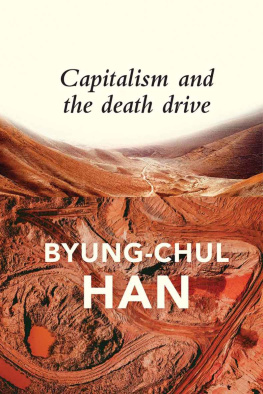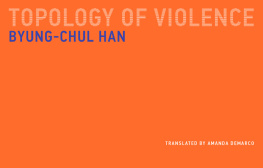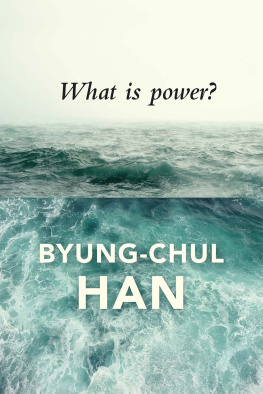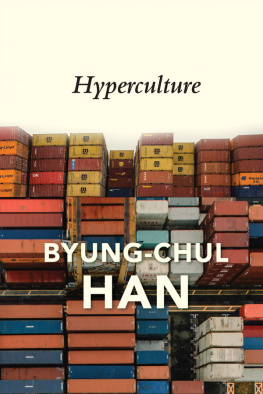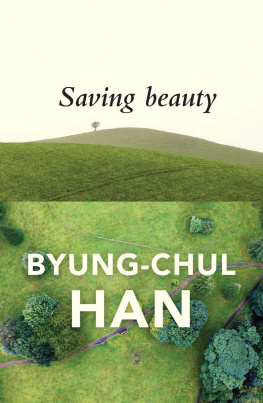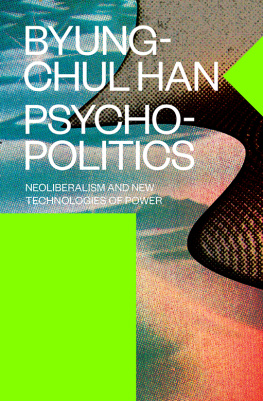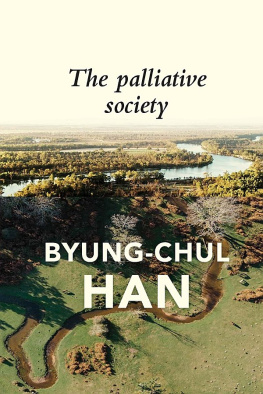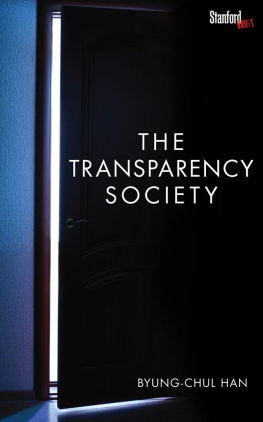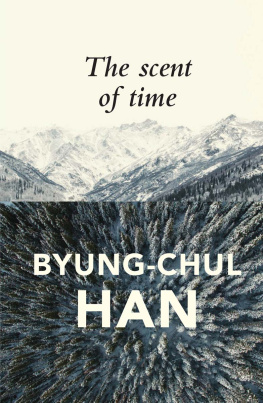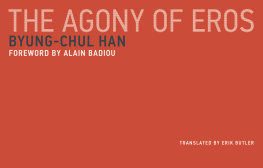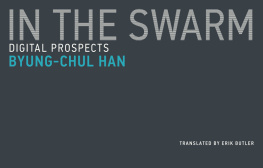All rights reserved. No part of this book may be reproduced in any form by any electronic or mechanical means (including photocopying, recording, or information storage and retrieval) without permission in writing from the publisher.
This book was set in PF Din Text Pro by Toppan Best-set Premedia Limited. Printed and bound in the United States of America.
Names: Han, Byung-Chul, author.
Title: The agony of eros / Byung-Chul Han ; foreword by Alain Badiou ;
translated by Erik Butler.
Other titles: Agonie des Eros. English
Description: Cambridge, MA : MIT Press, 2017. | Series: Untimely meditations
| Includes bibliographical references and index.
Identifiers: LCCN 2016031913 | ISBN 9780262533379 (pbk. : alk. paper)
Subjects: LCSH: Love. | Desire. | Burn out (Psychology)
Classification: LCC BF575.L8 H334 2017 | DDC 128/.46--dc23 LC record available at
https://lccn.loc.gov/2016031913Data
Foreword: The Reinvention of Love
In this book, Byung-Chul Han bears witness to how love in the strong sense that a long historical tradition has granted it is threatened. Perhaps it is already dead at any rate, it is gravely ill. Hence the title, The Agony of Eros.
But whose blows have struck true love so low? The perpetrators are contemporary individualism, the effort todetermine the market value of everything, and the set ofmonetary interests that now govern all conduct. In truth,love refuses to accept all such norms of the contemporaryworld the world of globalized capitalism because it isnot a simple pact of pleasant coexistence between two individuals;rather it is the radical experience, perhaps to theoutermost point, of the existence of the Other.
To demonstrate as much, the author offers a kind ofphenomenology of true love including sexual love andtracks down, in their many forms, the threats it faces. On theone hand, this involves describing what occurs in the absoluteexperience of alterity; on the other, it means indicting,on an array of different registers, all that draws us awayfrom such experience and even prevents us from seeingthat it exists at all, or the consequences this circumstancebrings.
Implacably, Han argues that the minimum conditionfor true love is possessing sufficient courage to acceptself-negation for the sake of discovering the Other. At thesame time, he provides an intensive survey of all the trapsset for, and attacks perpetrated on, the very possibility oferos in a world that, as it stands, cares only for agreement,agreeability, and narcissistic gratification.
This work proves utterly absorbing precisely because ofits unlikely combination of philosophical rigor (it concludeswith a striking quotation from Deleuze and Guattari) and awealth of far-ranging sources.
The first chapter enlists Lars von Triers Melancholia, as well as Bruegels The Hunters in the Snow and WagnersTristan und Isolde (both of which are featured in von Triersfilm), to show how the disastrous irruption of pure exteriority the wholly Other represents a catastrophe for theordinary balance of the subject. By the same token, however,apparent disaster offers the good fortune of escapeand absence from oneself and ultimately shows the wayto redemption.
After a severe critique of Foucault who is faulted forvalorizing ability, power (in opposition to the passivity ofknowledge), and therefore performance the second chapterfeatures a measured appreciation of Levinas and Buber,who discerned that, as Han puts it, Eros is a relationshipto the Other situated beyond achievement, performance,and Can. What escapes Foucault entirely, and Levinasmerely touches on, is, in fact, a central argument of thebook: The negativity of Otherness that is, the atopia ofthe Other, which eludes all ability is constitutive of eroticexperience. This striking formulation represents, as itwere, the matrix of the work as a whole: Only by way ofbeing able not to be able does the Other appear. The experienceof love, then, is shot through with powerlessness theprice to be paid for all revelation of the Other.
By way of a striking reading of Hegel, the third chapteridentifies the power of love as a new measure of the Absolute.There can be no Absolute without absolute negativity.Only in love can Spirit assume the experience of its ownannihilation that is, as Hegel puts it, preserve itself evenin death because, for the Other to arrive, one must nolonger be anything at all. In declaring as much, Hegel madeBataille possible. Han quotes with delight the latters terriblewords: Eroticism, it may be said, is assenting to life upto the point of death.
The fourth chapter revisits the classic oppositionbetween eroticism and pornography. Taking up Agambenand Baudrillard and not without ample criticism Hanshows how pornography is nothing other than the profanationof eros. These pages include a brilliant appraisal of theculture and value of exhibition: Capitalism is aggravatingthe pornographication of society by making everything acommodity and putting it on display. Knowing no other usefor sexuality, it profanes eros into porn. Love alone permitseroticism, or sex, to be ritualized instead of being puton show. Thereby is the mystery of the Other which contemporaryexhibitionism is degrading into a dull article forconsumption preserved, even in nakedness.
The fifth chapter takes the reader on a journey in thecompany of Eva Illouz (Why Love Hurts), Flaubert, Barthes,and others to explore how love so rich in varied fantasiesabout the Other lies in the throes of agony because thecontemporary universe of normalization and capitalizationpresents the inferno of the same at every turn. Hans profoundanalysis shows how the barriers, borders, and exclusionsthat capitalism produces, especially between rich andpoor, derive not so much from difference as from the identical:Money, as a matter of principle, makes everything thesame. It levels essential differences. As configurations forshutting-out and excluding, such borders abolish fantasiesof the Other.
The sixth chapter reveals the connection between loveand politics. Via a subtle discussion of Plato and his dynamicconception of the soul which love steers toward the Idea a marked contrast emerges to what Han calls burnoutsociety, a remarkable coinage extremely well-suited to ourworld today. The author offers a strong reading of my ownthesis that love is a Two scene a dual perspective and,by virtue of this fact, represents a kind of basic politicalmatrix. The chapter concludes with loves transformativepower: Eros manifests itself as the revolutionary yearningfor an entirely different way of loving and another kind ofsociety. Thereby, it maintains fidelity to what is yet to come.
The final chapter affirms that love is necessary forthought to exist at all. To be able to think, one must firsthave been a friend, a lover. So concludes an encomium oflove joined to a radical critique of a world that refuses it: tobe dead to love is to be dead to thought.


